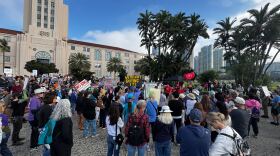When working with big computer data, the information can run into a bottleneck, and moving data from storage to processing takes too long. UC San Diego’s professor of computer science and engineering Tajana Simunic Rosing calls it a fundamental problem.
“When you analyze big data, such as new machine learning models, what ends up happening is you end up spending more than 90% of the time moving data to the computer,” Rosing said.
The solution is to improve artificial intelligence by making computer chips that process data and store data in a way that is a lot smarter and more integrated.
“We move whatever processing we can to where the data sits,” Rosing said. “That way it can run a lot faster and we can waste a lot less time."
The center Rosing talks about is called PRISM, the Processing with Intelligent Storage and Memory Center, founded in January and led by UC San Diego. The $50 million operation involves 10 universities and is mostly funded by the Semiconductor Research Corporation.
Examples of the computer bottleneck include one that’s well known to news media that produce video content like KPBS: It takes a large amount of time to send data-heavy video files to a computer to be processed and mined for video clips.
Rosing suggests a future alternative, using better computer chips.
“What you would ideally like to do is you would like to send a little question. ‘Find me a clip when somebody talks about new computer chip design, and send me only that clip,’” she said.
That request, she added, would go out to wherever the full video is stored, the specified clip would be found and delivered to the user, while the original full video file could stay where it is.
Rosing also said the time it takes to identify effective, experimental drug compounds, prior to clinical trials, takes years. She said improving the computer chips used to analyze those huge data stores could turn a yearslong process to one that takes days.
The effort to redesign computer chips and train people to use them is in line with a federal effort to improve computer equipment in the U.S. In August, President Joe Biden signed the Chips and Science Act, which allocates $52.7 billion for computer research, development and manufacturing.
PRISM expects to create a better computer chip in the near future.
“The goal is to have this figured out by five years from now,” Rosing said. “Hopefully in five years you will see some real exciting demonstrations.”







